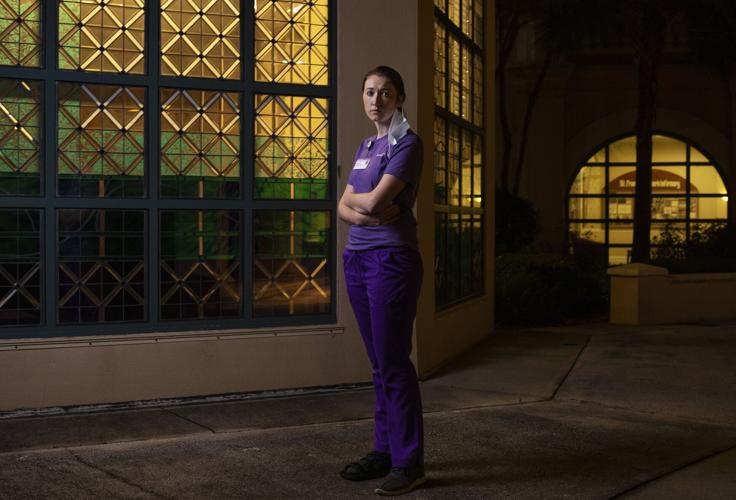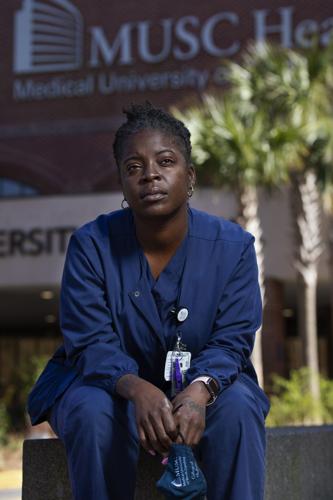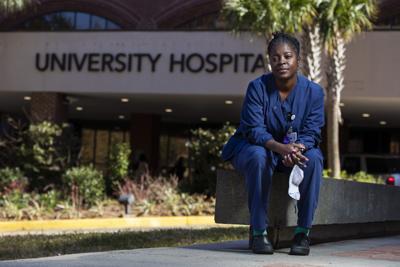On March 6 last year, everything changed.
At least, in South Carolina it did.
Other states had already reported their first cases of COVID-19, the strange new strain of coronavirus that would soon spread much more quickly than our capacity to contain it.
But that was before we knew. Before we started wearing masks to go grocery shopping. Before children were pulled from school or ICU beds started filling up or hundreds of thousands of people had died.
On that morning in 2020, though, South Carolina was still in a holding pattern, much the same as it had been for weeks. Because even though no one fully understood what was coming, it wasn’t a question of if — but when.
And then that evening, Gov. Henry McMaster’s office announced an unexpected news conference. Two patients in South Carolina, one of them in Charleston and the other in Camden, had tested positive for the virus.
These were state’s first two official cases, but it would soon become clear that COVID-19 had already taken hold here, silently slipping in front of a virological surveillance system that wasn’t even up and running yet.
For this grim one-year anniversary, The Post and Courier interviewed six hospital employees as they were each coming off a shift, all of them having become intimately aware over these past 12 months what the worst of this virus looks like.
Below, they share some of what they've seen in their own words. The following “Exit Interviews” have been lightly edited for length.
‘We wait and we wait and we wait.’
Anna Carol Landry is a nurse at Bon Secours St. Francis Hospital in West Ashley.

Anna Carol Landry, a registered nurse at Bon Secours St. Francis Hospital, poses for a portrait while leaving her shift on Thursday, Feb. 11, 2021. Lauren Petracca/Staff
"It’s hard to describe, but we have learned to recognize it in their eyes. They get this extremely, extremely fatigued — almost like they can’t hold on anymore — they get that look.
"They sit there, sometimes for three and four days, on the max amount of oxygen that we can give them without intubating them and they sit there and they struggle and they fight. Usually, they can’t even say more than few words. They can’t eat at that point because even eating, chewing takes their energy, takes their breath. We try to do the best we can to give them protein shakes, to keep their energy up, and talk to them. A lot of them are trying to do everything we ask them.
"Watching them try so hard for days, it’s a whole new beast. With any other disease process, most of the time, when a patient gets that labored with their breathing and gets that tired, you normally have them go to the ICU and they get intubated and they get that rest and they let the machine breathe for them.
"But with COVID patients, the research is typically that your chances are not very good when you get intubated and you might not come off. Chances are you won’t come off. And they have to tell these patients that up front. They have to make that decision. And so we wait and we wait and we wait as long as we possibly can before reaching that, and that is something that I’ve never experienced as a nurse, watching that prolonged struggle. And it is awful and hard to watch that.
"And sometimes we’re trying to update their families on the phone and you’re trying to convey how serious it is without taking away their hope, you know? Often, the patients can’t even talk to them at that point because they’re so exhausted. But just to see them try to rally for their family members, that’s the piece, too. If they can see their family and see what they’re fighting for, sometimes I feel like it makes a difference."
'It was too much.'
Michael Benson is an ICU nurse at Bon Secours St. Francis Hospital.

Michael Benson, an ICU nurse at Bon Secours St. Francis Hospital, holds a bag with a second change of clothes while posing for a portrait as he leaves his shift on Thursday, Feb. 11, 2021. Lauren Petracca/Staff
"In the ICU, we’re a little different in that we see a lot of bad things. We see a lot of death. We see a lot of sad stories. We see a lot of happy ones, too, but that’s kind of the thing. You always get a win here and there. Every once in a while you get to send someone home or your patient comes walking back in a few months later, thanks you and hugs you. And those are great. We didn’t get any of that this year, at least not in the COVID ward.
"When they’re sick enough to get to us, the end result has not been good as a general rule.
"At this point, I’ve learned to cope with it and I’ve learned to deal with it, but there was a point where it was too much. There was a point where I didn’t think I was going to hang in there a whole lot longer. Then, luckily, it kind of abated and we got a little breather and had a couple months where we weren’t really inundated. And then it came back. This run hasn’t been as bad. I’m vaccinated now. That makes me feel better.
"We still have bad cases. We still have deaths. All those things still exist. However, it’s not quite as overwhelming. I wouldn’t say that I got numb to it or I got used to it. It’s still there. But I think just having a year’s experience and having a little understanding of the virus and being around it for so long, at some point, you develop a familiarity with it and it’s not as big as it felt."
'I actually caught it.'
Ariel McKnight works in environmental services at Medical University Hospital, cleaning patients' rooms in the COVID-19 unit.

Ariel McKnight, an environmental services worker, poses for a portrait outside of MUSC’s Medical University Hospital, following her shift cleaning patients’ rooms in the COVID-19 unit on Thursday, March 4, 2021. Lauren Petracca/Staff
"I work there every day. At first, I was kind of skeptical about it. But I don’t know, I became accustomed to it and I kind of like it now.
"It’s actually like one big open space and everybody is separated by curtains. I clean all beds, all floors, wipe down everything around them. Killing germs.
"Most of the time, they are sleeping. But when I go in in the morning, I still say ‘good morning.’ They can hear you. The ones who are up? I speak to them, too. Really, they can’t say much because of all the coughing. But I ask them how they’re doing, how they’re feeling. The majority of them say they’re feeling all right for the most part. But sometimes they get worse and sometimes they get better. It does sadden me when someone gets worse.
"There was actually someone who didn’t make it and I was at work that day. That was pretty scary. He passed away on the unit. That was the first time I experienced something like that.
"Really, just trying to stay away from COVID has been the hardest this year. I actually caught it. I didn’t even know I had it. I went to the doctor for something else. Anytime you go to the doctor, they have to test you. That's how I found out I had it. I didn’t even have any symptoms, no fever, no loss of anything."
'I'm coming.'
Megan Higbie is a charge nurse and a rapid response nurse in the ICU at Roper St. Francis Mount Pleasant Hospital.

Megan Higbie, a charge nurse in the ICU, poses for a portrait shortly after ending her 12 hour shift at Roper St. Francis Mount Pleasant Hospital on Wednesday, Jan. 27, 2021. Lauren Petracca/Staff
"It’s a 12-hour shift. We come in at 7. If you’re a COVID nurse, you just take care of COVID patients. So in our ICU, you’re provided scrubs, we change into the scrubs. We pull our hair up and usually put some kind of bonnet on. And then you get your N-95 out and ready for the day. We try to gather all our supplies and medications before the day, before we go into the room, because when you go into a COVID room, you’re considered what we say ‘dirty’ and you’re not allowed to go anywhere else in the unit. There’s actually tape on the floor and that’s how we’ve stepped up our measures to try to keep people from contracting COVID. It’s just another kind of safety barrier.
"It’s two pairs of gloves. It’s a gown. We usually put a hair net on top of the bonnet, then the mask and a shield. What becomes challenging, if the patient is really desperately wanting you to run into the room — whether they’re confused or need to go to the bathroom right that minute — you have to explain to them, we have glass doors where you basically have to knock on the door and say ‘I’m coming’ as you gown up to go into the room to try to take care of them. Because ultimately, they want you safe before you run into the room. We were told from the beginning, if someone was coding, we were all to look out for ourselves. Everybody doesn’t go running in.
"A lot of the patients, if they’re sick enough to be in the ICU, they’re very short of breath typically. Coughing a lot. They either become confused or agitated or anxious because they’re so short of breath. Some will say they feel like they’re suffocating. They can’t catch their breath. At times, they’re trying to get out of bed to maybe reposition themselves or they’re just confused and don’t know where they are. The challenge, again, is to get yourself protected to go in there and reorient them and tell them it’s going to be OK.
"We get to know our patients quite a bit. Once they come to the ICU, they could be in there for a week to three weeks to a month. I think the toughest days are when you know your patient is headed towards a ventilator. As nurses, what we’ve learned is once you get on a ventilator, it’s very hard to get off. When these patients are struggling to breathe and we’re calling the family and the family and the patient are basically talking and saying ‘I love you,’ it truly could be the last time they talk to each other."
'I was nervous. Still am nervous.'
Hannah Burchard is a patient care technician in the COVID-19 unit at Trident Medical Center in North Charleston.

Hannah Burchard, a patient care technician in the COVID-19 unit, poses for a portrait while leaving her shift for the day at Trident Medical Center in North Charleston on Tuesday, Feb. 23, 2021. Lauren Petracca/Staff
"My dad actually passed away from cancer a year and a half ago and ever since I took care of him, along with my grandparents, I fell in love with helping people and being able to be there when their families aren’t.
"I’ve been on second-floor oncology since I started here and our floor just happened to get turned into a COVID unit. I definitely threw fits at times, like ‘I don’t want to be here! I’m going to catch it!’
"I was scared. It's turned into a normal thing now. It’s weird. It’s like an everyday thing. I’m always on that floor. I don’t get floated to other floors or units. But I was nervous. Still am nervous, but I’ve become more comfortable and confident. There are people who’ve come from other floors, who don’t work with the COVID patients, and I have to say, ‘Woah, woah, woah. Stop. This is what you need to do. These are the protocols.’"
'It kind of broke my heart.'
Haylee Seidenberg is a charge nurse in the emergency room at Trident Medical Center.

Haylee Seidenberg, a charge nurse in the emergency room, poses for a portrait while leaving her shift for the day at Trident Medical Center in North Charleston on Tuesday, Feb. 23, 2021. Seidenberg wears the photograph of herself attached to her scrubs so that patients can see what she looks like without her PPE. Lauren Petracca/Staff
"It’s been really challenging. It’s been really difficult. But I don’t think that nurses have ever felt so supported in their lives. It’s been rewarding in some sense, kind of getting the recognition that we don’t always get. It’s been nice to hear ‘thank yous.’ But it comes at a cost.
"The holidays were really difficult. I worked Christmas Eve and Christmas Day. That was really hard because people don’t come in on the holidays unless they absolutely have to. They’re hard to work anyway, but it was extremely difficult because we had a lot of really sick patients come in on Christmas, specifically. It’s a holiday. Most of their families couldn’t be with them. It was just really sad. It kind of broke my heart. For selfish reasons, too. I wanted to be with my family and couldn’t.
"It comes in waves. There are some days where it’s just, ‘I don’t know if I can come back tomorrow. I don’t know if I can take another loss. I don’t know if I can keep working this hard and this hard.’ And some days, it’s like ‘I did a really good job today. I actually helped somebody.’
"It’s overwhelming. Every day, you feel a sense of overwhelming."


















